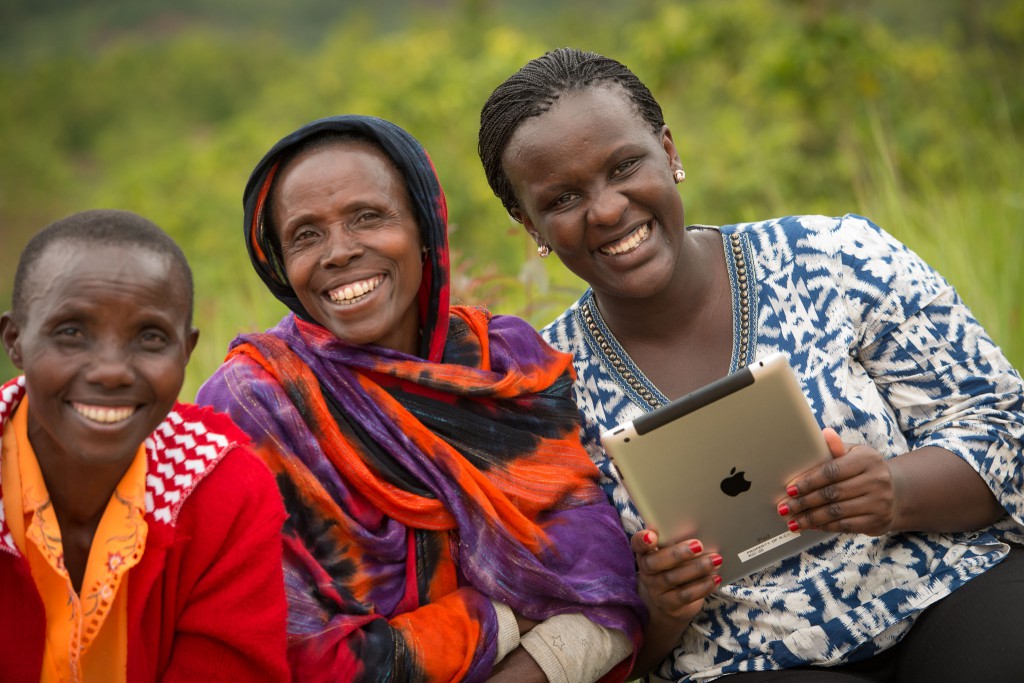Q&A with Esther Mukundane of Sustainable Harvest Rwanda: Creating opportunity for female coffee farmers in Rwanda

Sustainable Harvest is the pioneer of the Relationship Coffee Model, a system of sourcing that stresses quality, transparency, and sustainability throughout the supply chain. Through a three-year grant from Bloomberg Philanthropies, Sustainable Harvest recently launched a nonprofit entity, the Relationship Coffee Institute, which will create economic opportunities for women in the Rwandan coffee trade.
As part of the launch of the Relationship Coffee Institute, Sustainable Harvest held a regional version of its Let’s Talk Coffee event. Bringing together 80 female coffee farmers from rural areas, Let’s Talk Coffee Rwanda offered trainings both on the entire coffee value chain and on mushroom and honey production. The event also brought together roasters, retailers, NGOs, and senior government officials to discuss challenges and strengthen opportunities for smallholder farmers to make connections in the value chain.
In this Q&A, Bloomberg Philanthropies asked Esther Mukundane, country director of Sustainable Harvest Rwanda, about her experience at Let’s Talk Coffee, what surprised her the most about the event, and how everyone can support the initiative:
Bloomberg Philanthropies: What sets Sustainable Harvest Rwanda’s Relationship Model apart from other organizations?
Esther Mukundane: The Relationship Model is an interactive process in which everyone is given an equal opportunity. It’s an all-inclusive model, so farmers are treated the same way as buyers, financial service providers and other links of the chain. This inclusivity is different from other organizations, which often train district level leaders that then pass the information on to the farmer. Sustainable Harvest trains farmers directly, incorporating their feedback, making them part of the process, and ultimately empowering them.
BP: How did you become involved with Sustainable Harvest Rwanda?
EM: I had been working in Nairobi for two years with the United Nations Development Program on a regional project focused on small and medium enterprises. I joined Sustainable Harvest Rwanda last September. One reason I joined was that I wanted to come back home and be part of the development process again. Another factor was that the program focused on women, and I have a lot of passion for women-focused development projects. The coffee industry is new to me, but I have an agronomy background and am learning quickly. I’m excited to be part of an organization that improves the lives of the people it works with across the world.
BP: What was one of the top highlights from the Lets Talk Coffee Rwanda program?
EM: For me, the highlight was hearing the women talk during the testimonials at the end of the two-day training. I was so happy to see how confidently the women stood up there to talk about how Let’s Talk Coffee has impacted their livelihoods and how they plan to implement the knowledge they acquired during the training. That was my main takeaway from the whole Let’s Talk Coffee event.
BP: What feedback or comment from the women attending the event surprised you the most?
EM: What I found most surprising is that prior to this event the women never knew what happened to their coffee. They knew how to plant and harvest it, but they didn’t know what the end product looked or tasted like. Seeing the surprise on the women’s faces as they tasted coffee for the first time during a training session was amazing to me. Another training session went over the roasting process, and it was surprising to me how excited the women were to see that. One of the women asked me, ‘Can I actually roast my coffee? How can I do that?’ I would love if we could teach the women to use Rwandan tools to roast coffee in their homes. When you look at how Ethiopia has made coffee ceremonies a part of its culture, I would love to do something like that, but the Rwandan way.
BP: How can those who are living outside Rwanda help support this initiative?
EM: There are quite a number of roasters who buy Rwandan coffee, and they could have a huge impact on the program. Just buying the women’s coffee, once it becomes available through Sustainable Harvest, will be a direct way to contribute. For coffee lovers in North America, you can find Rwandan coffee at many locations, from small boutique roasters to national brands like Green Mountain Coffee Roasters. Another way to support the initiative is to fund various projects. Currently they’re looking at setting up a cafe that will also serve as a training center, and they will need equipment to turn it into a functional space. Once that cafe is in place, Rwandan coffee growers will be able to exchange ideas and learn a lot about the coffee industry, and I think it will make a huge difference in these people’s lives.